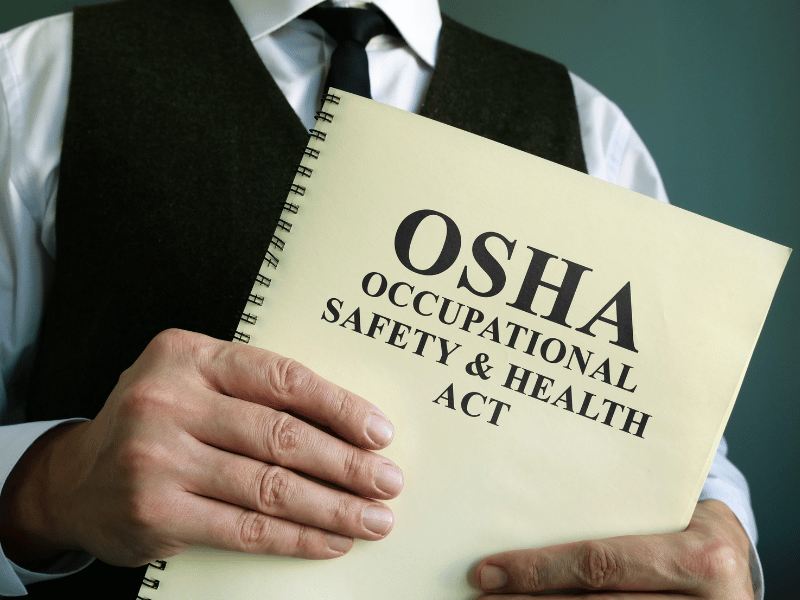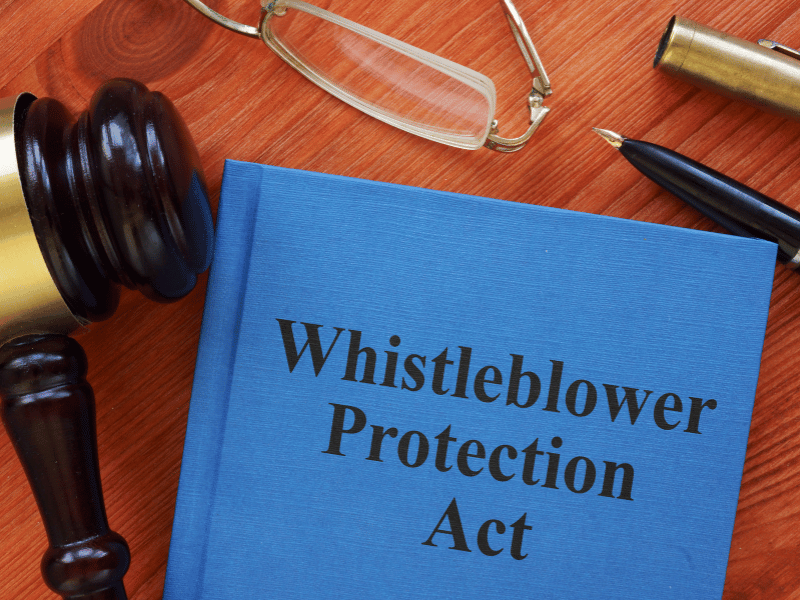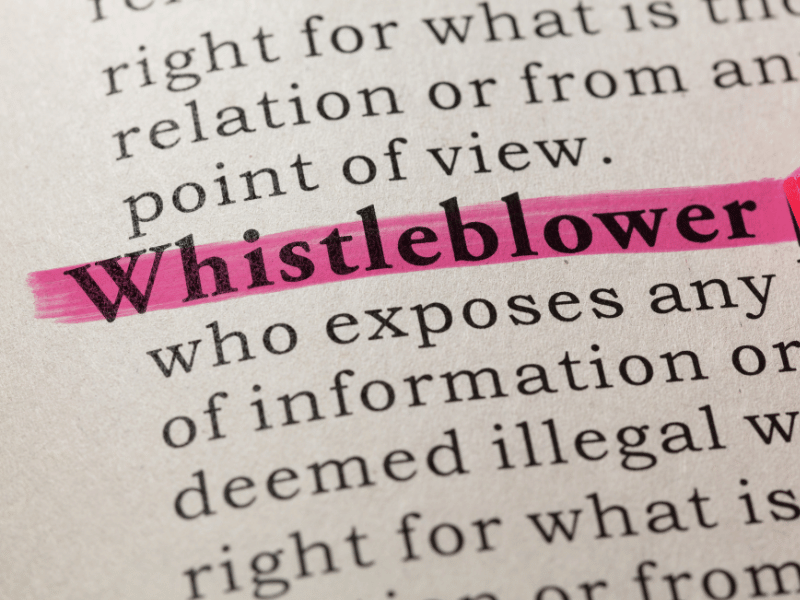The Occupational Safety and Health Administration, or OSHA, allows employers and employees to file whistleblower complaints. This article discusses the OSHA whistleblower program in detail, specifically its laws, rewards, and processes.
Table of Contents

What Is the OSHA Whistleblower Program?
The OSHA Whistleblower Protection Program enforces 20 federal laws protecting employees who suffer retaliation after filing a complaint with the Occupational Health and Safety Administration (OSHA). Under these laws, whistleblowers have the right to report workplace hazards and violations to OSHA. In other words, it’s illegal for employers to discharge, discriminate, or retaliate against workers who file OSHA violations in their workplace.
OSHA explains that retaliation against whistleblowers includes:
- firing or laying off
- demotion
- withholding overtime, promotion, or benefits
- disciplining
- refusing to hire or rehire
- intimidating, harassing, or threatening
- reassigning to less desirable positions
- taking steps that affect promotion
- reducing or changing pay or working hours
- subtle acts like isolation, mocking, false accusations, and discrimination
- blacklisting to prevent future employment
- reporting or threatening to report the employee to the police or immigration authorities
- making working conditions intolerable so the employee will resign
An example of employer retaliation is the case against a Georgia pesticide and agricultural chemical manufacturer. The Department of Labor filed a federal court complaint against the company after it allegedly terminated an employee for filing a safety and health complaint with the Department.

Understanding Your Rights Under the OSHA Whistleblower Program
No comprehensive “OSHA Whistleblower Act” covers all whistleblower protections in the United States. However, specific statutes or federal laws contain anti-retaliation provisions and worker’s rights, each tailored to a particular industry or a type of misconduct.
Whistleblowers are protected when they file complaints related to the following federal statutes:
- Affordable Care Act (ACA)
- Anti-Money Laundering Act (AMLA)
- Asbestos Hazard Emergency Response Act (AHERA)
- Clean Air Act (CAA)
- Comprehensive Environmental Response, Compensation and Liability Act (CERCLA)
- Consumer Financial Protection Act of 2010 (CFPA)
- Consumer Product Safety Improvement Act (CPSIA)
- Criminal Antitrust Anti-Retaliation Act (CAARA)
- Energy Reorganization Act (ERA)
- FDA Food Safety Modernization Act (FSMA)
- Federal Railroad Safety Act (FRSA)
- Federal Water Pollution Control Act (FWPCA)
- International Safe Container Act (ISCA)
- Moving Ahead for Progress in the 21st Century Act (MAP-21)
- National Transit Systems Security Act (NTSSA)
- Occupational Safety and Health Act (OSH Act), Section 11(c)
- Pipeline Safety Improvement Act (PSIA)
- Safe Drinking Water Act (SDWA)
- Sarbanes-Oxley Act (SOX)
- Seaman’s Protection Act (SPA)
- Solid Waste Disposal Act (SWDA)
- Surface Transportation Assistance Act (STAA)
- Taxpayer First Act (TFA)
- Toxic Substances Control Act (TSCA)
- Wendell H. Ford Aviation Investment and Reform Act for the 21st Century (AIR21)
Who Is Covered by the OSHA Whistleblower Program?
The OSHA whistleblower program protects all private sector employees in various industries, including but not limited to the general industry, construction, maritime, agriculture, transportation, healthcare, nuclear power, and environmental protection. Furthermore, OSHA Temporary Worker Initiative Bulletin No. 3 – Whistleblower Protection Rights emphasizes that “temporary workers have the same rights and protections against retaliation as all other workers.”
OSHA Whistleblower Protection Program clarifies that the OSHA Act generally doesn’t cover retaliation allegations from federal employees, except those working for the US Postal Service. Some environmental protection statutes also protect federal employees. However, federal agencies are required to implement procedures to prevent retaliation. Most executive branch employees are also protected under the Whistleblower Protection Act of 1989.

How to File a Whistleblower Complaint With OSHA
1. Determine the time frame for filing a complaint.
Identify the applicable time frame for filing your whistleblower complaint based on the specific statute. The time frame begins when the adverse action (e.g., firing) happens and is communicated to you. You can check the time limits for each statute on OSHA’s How to File a Whistleblower Complaint.
2. Choose a filing method.
Select one of the options to file your OSHA whistleblower complaint:
- Online – Complete and submit the Online Whistleblower Complaint Form.
- Fax/mail/email – Send a letter describing your complaint or a printed copy of the Whistleblower Complaint Form to your local OSHA Regional or Area Office via fax, mail, or email. When sending a fax, choose a secure online fax service to protect the sensitive information in your complaint.
- Phone call – Call your local OSHA Regional or Area Office to submit your complaint verbally or in writing.
- In-person – Visit your local OSHA Regional or Area Office to submit your complaint verbally or in writing.
3. Include necessary information
Include important details to assist in the investigation. These are not required, but they may be helpful:
- Current job description
- Hiring and/or termination documents
- Documentation regarding additional complaints, disciplinary actions, last five pay stubs, documents of proceedings related to your complaint (e.g., lawsuits or EEOC complaints), and other lawfully acquired documents (e.g., emails, meeting notes, phone records, SMS, memos, etc.) related to your complaint
- Names, titles, and contact information of potential witnesses and management officials involved in the personnel decision
4. Submit the complaint.
File the whistleblower complaint using the chosen filing method. Remember to include relevant documentation to support your complaint and help the OSHA investigator. OSHA will contact and interview you to determine if it needs to investigate your complaint.
5. Wait for the investigation and resolution.
If OSHA decides that your complaint warrants an investigation, it will gather information from your employer and witnesses. If the evidence supports your complaint, OSHA will take action and may require your employer to restore your job, earnings, benefits, and other appropriate relief.
Do You Get OSHA Whistleblower Rewards for Filing a Complaint?
No. When you report an OSHA violation, you don’t get a reward. OSHA only focuses on protecting employees against employer retaliation. According to Maynard Nexsen law firm, OSHA’s authority is limited to investigating whistleblower claims, not ordering payments.
After an investigation, OSHA can propose remedies like back wages, reinstatement, employee’s lawyer’s fees, and compensatory damages, but these are not final orders. The employer can still appeal OSHA’s decision, request a hearing, and present evidence that their actions were not retaliatory against an employee.







